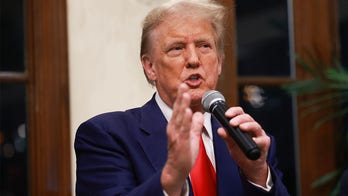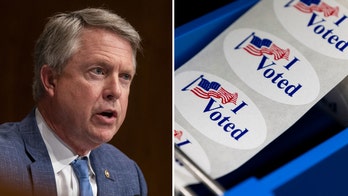Senate leaders are hoping to vote later this week on whether to release the second half of the $700 billion financial bailout package, which President-elect Barack Obama is seeking.
President Bush on Monday sent a request for the $350 billion to Congress on behalf of the incoming administration.
Sources told FOX News that Senate leaders are hoping to call a vote on the measure some time between Thursday and Saturday, though it's unclear whether Obama's request would be approved. Only one chamber of Congress needs to approve the funding.
Administration officials made clear that Obama, who would be spending the money, will also have to make the case for it.
"The best course of action, of course, is to convince enough members of the Senate to vote positively for the request," Bush told reporters Monday morning.
Congress has 15 days to act once the formal request is made.
The process for approving the money is complicated, and would require lawmakers supportive of Obama's request to vote against the measure that comes to the floor -- called a motion of disapproval. If they vote against the measure, the Obama White House gets the money. If they vote for the measure, then they are denying Obama that money.
Opponents to the release of the money would need 51 votes to deny the funds, and several sources said that seems achievable.
But they would ultimately need 67 votes to override a likely presidential veto, which would be tougher. In other words, supporters of Obama's request need only round up one-third of the Senate to approve the money.
Obama's pick for treasury secretary, Timothy Geithner, has been working with Senate Banking Committee Chairman Chris Dodd, D-Conn., on ways to reshape the program and in turn generate more support for the proposal.
The unpopular bailout has so far featured unconditional infusions of money into financial institutions that have done little to account for it.
Republicans in both chambers are skeptical about the second half of the bailout money, particularly because they think the recent use of some funding to bail out the auto industry signaled that the money is heading toward those with political clout rather than struggling financial institutions.
House Republican Leader John Boehner said it would be "irresponsible" of Congress to release any more money. George Rep. Tom Price, chairman of the Republican Study Committee, said in a written statement that the request for the funding is "troubling and disappointing."
But Obama at least has the support of the top Republican on the Senate Budget Committee, New Hampshire Sen. Judd Gregg. Gregg told FOX News he feels "very strongly that they need this resource," though he acknowledged that many lawmakers are "disgruntled" with the package so far.
House Speaker Nancy Pelosi released a statement Monday saying the House will vote this week on separate legislation from Rep. Barney Frank, D-Mass., ensuring more accountability to the distribution of the money.
But that could be a symbolic vote, since Obama might already have the bailout money by the time such legislation moved to the Senate -- if it moved to the Senate.
Rather, Democrats are seeking a "letter of assurances" from Obama's economic team spelling out conditions they will impose on the rest of the bailout money by the time the measure comes up for a vote.
Obama's transition team on Monday released a letter addressing several of these provisions. The team sent the letter to Democratic and Republican lawmakers spelling out reforms that the president-elect intends to make for the distribution of the second half of the funding.
Obama economic adviser Larry Summers wrote in the letter that the bailout prevented a "crisis" from becoming a "catastrophe," but that Americans have become "angry" after seeing too little effect from the plan on jobs, incomes and home-ownership. He also wrote that the process has not been transparent.
"That will change when President-elect Obama takes office," Summers wrote.
Summers pledged to increase oversight of the distribution and ensure a "full and accurate accounting" of the money. He pledged that the administration would help restart lending, address the foreclosure crisis better, encourage private investment over public funding and impose "tough and transparent" conditions on firms receiving the money. Those would include limits on executive compensation and dividend payments.
Summers plans to return to the Senate for another round of meetings Tuesday with Senate Democrats on the finance committee, sources told FOX News.
FOX News' Jim Angle and Trish Turner and The Associated Press contributed to this report.




